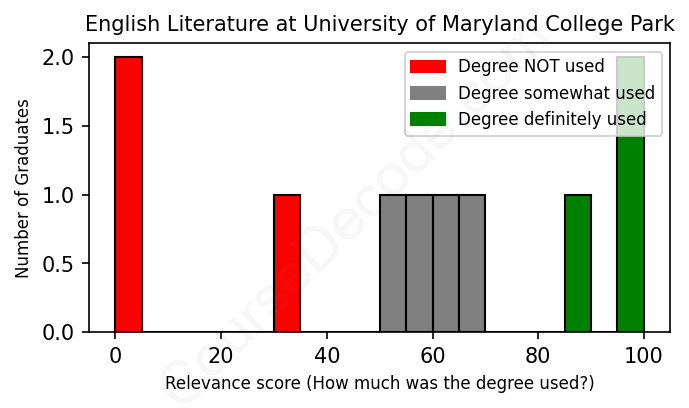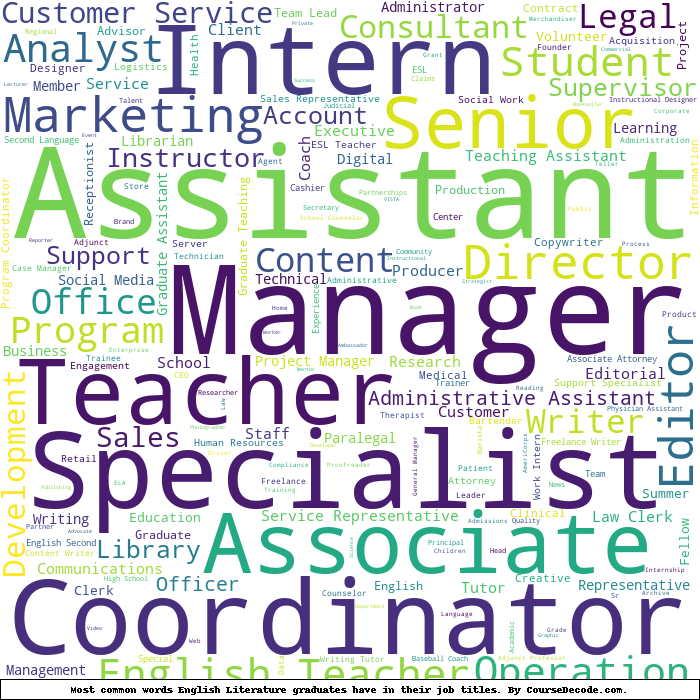
First, some facts. Of the English Literature graduates from University of Maryland College Park we've analyzed , here's how many have used (or NOT used) their degree in their career:

These are estimates based on AI analysis of 10 LinkedIn profiles (see below).
The verdict? Significantly below average. Overall, with an average relevance score of 55%, English Literature graduates from University of Maryland College Park have a much lower likelihood (-12%) of finding work in this field compared to the average graduate across all fields:
And for comparison, here's the chart for all profiles we've looked at across all degrees.
Also, after graduating, 50% of these graduates have pursued further education other than another Bachelor's degree (such as a Masters degree or other), compared to the average across all profiles of 35%. This suggests you may need more than just a Bachelors degree to be competitive as a English Literature graduate.
See the details:
|
Relevance score: 85% We think this person has gone into a career highly relevant to their degree. We think this person has gone into a career highly relevant to their degree.
DEGREE INFOGraduated in 2012 from University of Maryland College Park with a Bachelor of Arts (B.A.) in English Literature. Also pursued further education since (see below). JOB HISTORY SINCE GRADUATIONESL Instructor/Tutor Independant Contractor Sep 2014 - Oct 2016 Copywriter/Content Marketer  MagicalButter.com Jan 2016 - Jan 2017 PR Specialist  NisonCo May 2017 - May 2020 Freelance Copywriting/Content Marketing Specialist  Self-Employed Jan 2016 - Present FURTHER DEGREES DONE SINCE GRADUATINGCertificate - 100 hrsOxford English Seminars 2014 - 2014 ABOUTCurrently in St. Louis, MO, from Maryland/DC, with my heart always in West Africa |
The top 10 most common jobs done by the graduates we've analyzed (ranked most common to least) are:
From the profiles of graduates with a degree in English Literature from the University of Maryland College Park, it seems that many individuals have pursued careers that don’t directly align with their academic training. A significant number of jobs, especially in sectors like the military, legal field, and various administrative roles, show that graduates are often involved in positions that prioritize skills unrelated to literary analysis, such as leadership, compliance, or logistics management. For example, roles like Platoon Leader or Troop Executive Officer in the Army focus on operational and tactical knowledge rather than on the literary skills developed during their degree.
However, there are also notable exceptions where graduates have landed roles that utilize their English Literature background effectively. Positions like Copywriter, Editor, and Content Manager prominently feature writing and communication skills that are indeed rooted in their English studies. For instance, roles such as Content Writer at Grovo or Senior Scriptwriter at Vox Media clearly demonstrate how these individuals are successfully leveraging their analytical and writing skills in the professional sphere. While it seems that a mix of career paths exists, the relevance of jobs to the English Literature degree varies widely, ranging from highly applicable to seemingly disconnected from their studies.
Here is a visual representation of the most common words in job titles for English Literature graduates (this is across all English Literature graduates we've analyzed, not just those who went to University of Maryland College Park):

Looking at the career paths of English Literature graduates from the University of Maryland College Park, it's clear that they have varied experiences. For many, the first jobs after graduating tend to be in writing, editing, or related fields, which align nicely with their degrees. Roles like content writer, copywriter, or even teaching English as a second language appear to be common starting points. Others have ventured into more unique paths, such as military service or legal internships. It’s interesting to see that some graduates began in traditional literary roles and transitioned into positions in corporate or technical sectors over time, showcasing flexibility in their skill sets.
Five to ten years down the line, many graduates seem to climb the ladder in fields related to their degree, like content management or editing, and a good number make strides into managerial roles. For instance, graduates have advanced from roles like junior copywriter to senior copywriter or even director positions at reputable companies. However, there’s a noticeable trend where not everyone stays strictly within the literary realm; some have moved into business analytics, compliance, and project management—probably leveraging their communication skills into broader job markets. Overall, while some alumni have found fulfilling careers that tie back to their English Literature roots, others have followed alternative trajectories that might not directly relate to their major but still utilize critical thinking and communication skills honed during their studies. So, while there are solid successes, there’s also a mix of paths that don’t necessarily align with English Literature directly.
So, here's the deal with getting a Bachelor’s degree in English Literature at University of Maryland College Park—or really anywhere, for that matter. It can be a bit challenging, but it also has its perks. You'll be reading a lot of novels, poetry, and plays, so if you enjoy diving into different worlds and analyzing texts, it can actually be pretty fun! The workload might feel heavy at times with essays and presentations, but if you're passionate about literature and can handle discussing themes and characters, you’ll probably find it manageable. Overall, it’s about average in terms of difficulty compared to other majors, but passion for the material makes a huge difference. Just be prepared to think critically and write a fair amount!
Most commonly, in the LinkedIn profiles we've looked at, it takes people 4 years to finish a Bachelor degree in English Literature.
Looking at the job histories of these University of Maryland graduates, it seems like they generally landed some decent positions that likely come with a reasonable paycheck, especially for early career roles. For example, the graduates who climbed the ranks in corporate roles, like the ones at Eversource Energy or Cornerstone OnDemand, probably pull in some solid salaries, considering their progression to senior management. On the other hand, those pursuing creative fields or education, like copywriting or ESL, may face a wider range of earnings, but it’s tough to say for sure how well they’re doing since those roles can vary quite a bit in pay. Overall, it looks like many of them have found their way to stable careers, which suggests they’re doing alright financially, though some may be hustling a bit harder than others to make the same money.
Here is a visual representation of the most common words seen in the "about" section of LinkedIn profiles who have a Bachelor degree in English Literature (this is across all English Literature graduates we've analyzed, not just those who went to University of Maryland College Park). This may or may not be useful:

Here are all colleges offering a Bachelor degree in English Literature (ordered by the average relevance score of their English Literature graduates, best to worst) where we have analyzed at least 10 of their graduates: